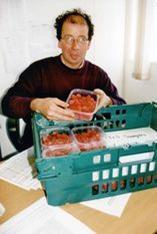
The farm is the packhouse site that serves 37 acres of soft fruit grown by Adam Shorter. In the peak of the season it handles 50,000 punnets a day for major multiples who are demanding more and more home-grown fruit. The farm is a major supplier of fresh raspberries to Marks & Spencer.
Less than three miles away, near the picturesque village of Penshurst, the sun shimmers on a sea of plastic tunnels tucked away down a leafy lane. It is here that a new generation of fruit is being nurtured, with the eventual aim of providing continuity of supply from June to November.
The 30 acres under production is home to established Glen Ample, followed by later fruiting varieties, Octavia, and a lesser known US proprietary primocane raspberry variety called Isabel.
Through its exclusive relationship with Driscoll’s in the UK, Isabel is under trial by KG Fruits - of which Adam Shorter is a member. The first three acres were only planted last May and are already coming into bearing on the floricane crop.
Virtually all the raspberry production is protected by tunnels and can be irrigated. While it represents major investment - an acre of tunnels can cost between £6,000 and £7,000 - Shorter believes such cultivation techniques hold the future for the industry.
“Obviously, we are all looking for raspberries that grow well and taste better,” he says, “but we also need to extend the season in both directions. This is already happening and this year we are beginning to iron out the peaks and troughs that have been a hallmark of the industry.”
Protected fruit crops earlier, and new strains keep continuity going until temperatures simply become too cold, he explains. There are also ongoing trials of “primocane types” which can be in production in the first year of planting, and then by pruning away the old growth, crop again within four months.
The particular prize is the late autumn period when overall UK volumes are lower and, as a result, can be sold at higher prices.
The key element however, is that tunnels protect the fruit from wind, rain and infection, keeping the canes and fruit dry so the 150 pickers at the peak of the summer season can work uninterrupted. This in turn, says Shorter, can double shelf life if the fruit is handled in peak condition.
“Simplistically, it means that you can pick all you grow,” he says with some satisfaction during a season in which records may be broken. Conditions have been so good that Steve Kember, farm manager, is expecting yields of up to eight tonnes an acre. In July canes over 10 feet high were being supported with extra stringing because of the weight of fruit.
Shorter has been growing raspberries for more than 15 years and is a regular prize-winner at Kent’s National Cherry & Soft Fruit Show.
Three years ago, sensing the increasing impetus the crop was enjoying, he consolidated his production area which was spread across several locations in this corner of Kent, and expanded the existing site.
Just how far the industry has come in a short time is evident by the market growth since he made that sensible decision.
“In 2002, raspberry retail sales to the end of June were estimated [by TNS] to be around £30 million but two years on, the level of sale has risen to £52.3m,” says Richard Harnden, technical director at KG Fruits.
“The UK raspberry market grew by over 40 per cent in 2003 and KG’s growers and our imported Driscoll’s raspberries have supplied a large part of that additional sales growth.”
Developments at Home Farm provide all the proof you need to believe that the sale of home grown raspberries will continue to rise in the next three years, and beyond.



